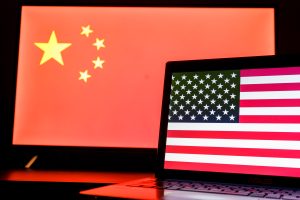The People’s Republic of China has embarked on a comprehensive campaign to purge foreign influences from its technological sectors. This initiative spans from hardware, such as semiconductors, to software and data management systems.
The unveiling of Document 79 illustrates a clear directive: By 2027, all foreign software is to be replaced in vital industries such as finance and energy. This policy, colloquially termed “Delete America,” mandates not only the exclusion of American software but also the systematic replacement of U.S.-made microprocessors, such as those from Intel and AMD, with domestic alternatives. This extends to operating systems and databases, where there is a marked shift from Western staples like Microsoft and Oracle to local versions.
These policies underscore China’s strategic objective to fortify its technological autonomy and ensure national security.
Moreover, China made a regulatory adjustment in cross-border data flows in March. The latest “Regulations to Promote and Standardize Cross-Border Data Flows” will determine which procedure companies must follow, depending on the volume of personal information and the definition of critical information infrastructure operator. Although seemingly alleviating restrictions for foreign firms with specific exemptions, this nuanced policy landscape suggests a calculated move toward reinforcing a self-reliant tech economy, while shaping the domestic and international norms of data governance.
China’s approach to technology policy is characterized by opaqueness and strategic ambiguity, particularly in the implementation and enforcement of its regulations. This vagueness is evident in the drafting of critical documents such as the Guideline for Identification of Critical Data and the Data Security Law, which embed a broad and often unclarified concept of national security. The EU Chamber of Commerce in China has raised concerns about the ambiguous definitions and classifications that complicate compliance and operational clarity for foreign enterprises.
Moreover, the “Delete America” agenda underscores a broader national policy rather than a mere slogan. This initiative can extend its reach from public sector agencies to potentially envelop, as Beijing deems appropriate, all industries under the strategic framework dubbed “2+8+N.” This strategy seeks to speed up technology innovation and application across eight critical sectors (among them: finance, telecommunications, electric power, and healthcare) and “N” important industries (such as automotives, logistics, electronics, construction, etc.), all under the guidance of party and government institutions (the “2”).
In short, the lack of transparency in China’s policymaking processes and the potential for expansive interpretation pose considerable risks and uncertainties for both domestic and international businesses.
The U.S. Countermeasure: Bolstering Data Security and National Defense
Responding to China’s aggressive tech policies, the United States has heightened its regulatory oversight and defensive postures under the Biden administration. Notable measures include actions from the White House this February investigating the implications of foreign-manufactured technology in connected vehicles and restricting the transfer of sensitive genomic data to China. These orders represent a proactive stance to mitigate the risks posed by potential cyber threats and espionage through technological mediums.
National security concerns now span various sectors beyond traditional military and industrial spheres. In the legislative arena, the U.S. Congress has demonstrated significant concern through the introduction of the BIOSECURE Act. This legislation aims to prevent U.S. biotechnological data from reaching entities linked to the Chinese government or military. By prohibiting federal engagements with certain Chinese biotech firms, the United States shows increasing commitment to safeguard sensitive genetic and personal health information.
Another standout example is U.S. President Joe Biden signing legislation passed by Congress that would force Chinese company ByteDance to sell the popular video app TikTok, or else see the app banned in the United States altogether. The move stemmed in part from concerns that ByteDance has close ties with the Chinese Communist Party and has been been permitting the Chinese government access to personal data collected by TikTok, which boasts over 150 million users in the United States.
The bipartisan support in the U.S. for stringent measures against the perceived threats of Chinese technological and data practices underscores a unified approach to national security. This consensus is pivotal, as it ensures the continuity and enforcement of policies irrespective of political shifts, thereby stabilizing the U.S. strategic posture against potential vulnerabilities in data security.
Future Outlook: Global Implications and Strategic Navigations
The technological tug-of-war between the United States and China is not merely a bilateral conflict but a phenomenon with global implications. The strategies adopted by both nations are setting precedents for data governance, cybersecurity, and international trade protocols in the digital age. As these superpowers continue to recalibrate their approaches to technology and data, their actions will inevitably influence global economic dynamics, international security policies, and the broader geopolitical landscape.
For businesses and investors, the evolving regulatory frameworks necessitate a vigilant and adaptive strategy. Understanding the implications of these policies on global operations and supply chains is crucial. Companies must develop robust compliance systems and risk management frameworks to navigate this complex and often unpredictable environment.
In conclusion, as China actively redefines the contours of data flow, the United States is actively responding to protect its own data integrity and security. The international community must remain astute observers and proactive participants. The ongoing developments will likely reshape not just the geopolitics but the international legal and business landscapes, compelling stakeholders across the globe to adapt to new realities of privacy, security, and economic competitiveness in an increasingly digital world.
This strategic competition highlights the urgent need for a concerted and coordinated effort to understand the crucial role that data can play, as well as the potential disruptions it can cause if it falls into the wrong hands and is weaponized by malicious actors.

































